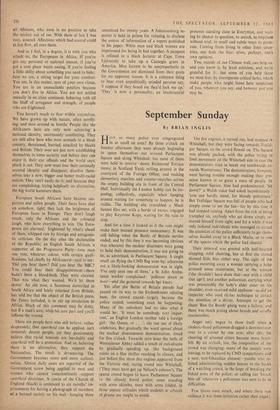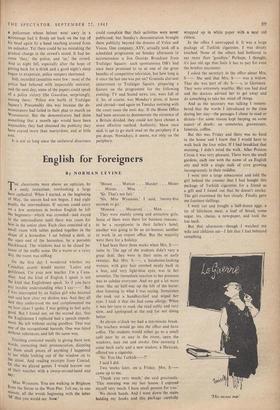September Sunday
By BRIAN INGLIS HAVE so many police ever congregrated in so small an area? By three o'clock on Sunday afternoon they were already beginning to space themselves - out around Parliament Square and along Whitehall; but most of them were held in reserve—down Richmond Terrace mews; in Scotland Yard; milling around in the courtyard of the Foreign Office; and making elementary marches and counter-marches across the empty building site in front of the Central Hall. Individually the London bobby can be im- posing; collectively, especially when hanging around waiting for something to happen, he is risible. The building site resembled a Mack Sennet film set; with a horde of extras, engaged to play Keystone Kops, waiting for the rain to stop.
And for a time it looked as if the rain might make their massed presence unnecessary. It was still falling when the Battle of Britain service ended; and by this time it was becoming obvious that wherever the nuclear disarmers were going to hold their demonstration, it was not going to be, as advertised, in Parliament Square. A single small car flying the CND flag went by; otherwise not a likely-looking demonstrator was in sight. Tye only seen one of them,' a St. John Ambu- lance worker complained: 'pullover down to here'—and she gestured towards hyr knees.
Yet after the Battle of Britain parade had passed on its way to the Embankment saluting base, the crowd stayed—largely because the police stayed; something must be happening. Many of the onlookers had no idea what it would be: 'It must be somebody very impor- tant,' an English London mother told a foreign girl: `the Queen, or . . .'; she ran out of likely celebrities. But gradually the word spread about the nuclear disarmament demonstration, timed for five o'clock. Towards zero hour the bells of Westminster Abbey added a touch of melodrama by gradually speeding up, like background music on a film thriller reaching its climax; and just before five three fire engines appeared from the Victoria end, racing round into Whitehall. (`They must have got up Nelson's column'). The sparse crowd began to leave Parliament Square to the already bored police; some standing with arms akimbo, most with arms folded, in those uneasy attitudes which students at schools of drama are taught to avoid. The fire engines, it turned out, had stopped in Whitehall; but they were facing towards Trafal- gar Square, so the crowd flowed on. The Square was already packed, with the police trying to limit movement on the Whitehall side in case the demonstrators tried to break out southwards to- wards Westminster. The demonstrators, however, were having trouble enough making their pre- sence known in so great a mass of people. In Parliament Square, blue had predominated; 'Sit down?' a Welsh voice had asked incredulously: `you can hardly stand, for bloody policemen.' But Trafalgar Square was full of people who had simply come to see the fun—for by this time it had stopped raining. Apart from the risk of being trampled on, anybody who sat down simply re- moved himself from sight, and for a while it was only isolated individuals who managed to attract the attention of the police sufficiently to get them- selves hauled away to a Black Maria, or to one of the spaces which the police had cleared.
Their removal was greeted with half-hearted clapping, mild cheering, but at first the crowd showed little bias either way. The sight of the police escorting away a woman carrying a baby aroused some resentment, but at the woman (`she shouldn't have done that—not with a child that age'); and another policeman, carrying what was presumably the baby's elder sister on his shoulder, even received mild applause—as did'an inspector who used tic-tac technique to attract the attention of a driver. Attempts to get the chant `Ban the Bomb' going were a failure; and there was much jesting about beards and scruffy macintoshes.
Anger only began to show itself when a choleric-faced policeman dragged a demonstrator over to a corner by one arm; after this, the cheering of arrested sitters became more heart- felt. By six o'clock, too, the composition of the crowd was changing; many of the casuals were leaving, to be replaced by CND sympathisers and a new, non-Ghandian element—youths who re- lished administering sudden heaves to the backs of a watching crowd, in the hope of breaking the linked arms of the police; or calling out 'knock him oft' whenever a policeman was seen to be in difficulties.
Few blows were struck, and where there was violence it was from irritation rather than anger: a policeman whose helmet went awry in a scrimmage had it firmly set back on the top of his head again by a hand reaching around from an onlooker. Yet there could be no mistaking the gradual change in the crowd's mood. It had be- come 'they,' the police, and 'us,' the crowd. And as night fell, especially after the hope of getting back for a drink and a good night's sleep began to evaporate, police tempers shortened.
Still, recorded casualties were few: most of the police had behaved with impeccable restraint; and the next day, some of the papers could speak of a police victory (the Guardian, surprisingly, among them: 'Police win battle of Trafalgar Square). Presumably this was because the de- monstrators had failed in their plan to march on Westminster. But the demonstrators had done something that a month ago would have been impossible; they had obtained the publicity they have craved more than martyrdom, and at little cost.
It is not so long since the unilateral disarmers could complain that their activities were never publicised; but Sunday's demonstration brought them publicity beyond the dreams of Voice and Vision. One company, ATV, actually took off a scheduled programme on Sunday afternoon to accommodate a live Outside Broadcast from Trafalgar Square: such spontaneous OB's had once been promised to us as one of the great benefits of competitive television, but how long is it since the last one was put on? Granada also sent cameramen to Trafalgar Square, preparing a feature on the programme for the following evening; TV and Sound news, too, were full of it. So, of course, was Monday's press, at home and abroad—and again on Tuesday morning with the court cases the next day. If the Home Office had been anxious to demonstrate the existence of a Britain divided, they could not have chosen a more effective method. Authority, Shaw once said, is apt to go stark mad on the periphery if a pin drops. Nowadays, it seems, not only on the periphery.











































 Previous page
Previous page